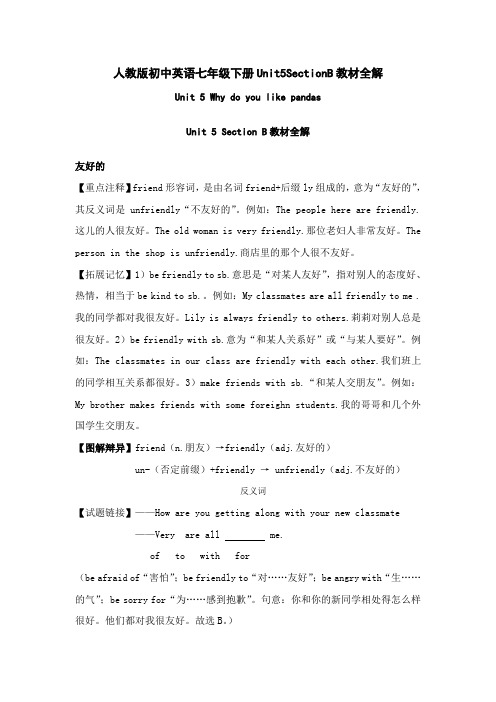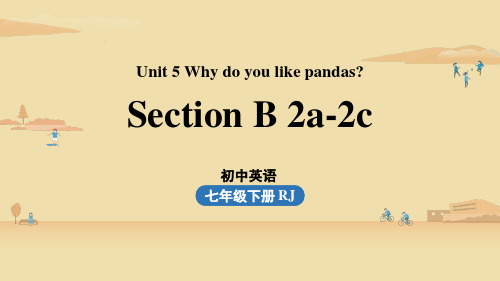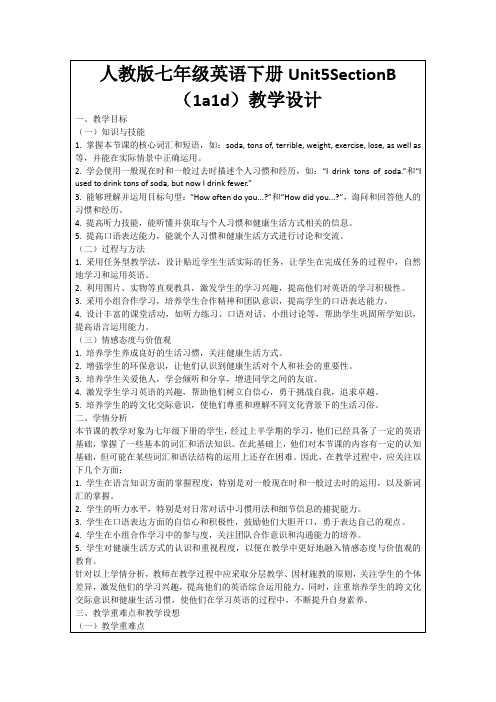人教版七年级英语下册Unit5_SectionB(1a-2c)精品课件
Unit5SectionB(1a1d)课件初中英语人教版新目标七年级下册

Section B (1a~1d)
Section B (1a~1d)
学习目标
1.能记住并能正确运用下列词汇:friendly、shy。 2.能恰当地运用形容词描述自己所喜欢的动物。 3.了解一些常见动物的习性,养成爱护动物、保护环境的 良好品质。
预习导学
你知道我们中国的国宝是什么动物吗?先观看一段视频,然 后谈谈你对它们的印象吧。
3.小调查:和同学自由谈论自己喜爱的动物,然后填表。
Names
Animals
Why
Li Dong
dogs
cute, friendly
·知识拓展·
friendly作形容词,意为“友好的”,由“friend(名 词)+ly”构成。“名词+ly”变成的形容词还有 love+ly→lovely“可爱的”;live+ly→lively“充满活力 的”。
Mary:Oh, Tony! So, where do you want to go? Tony:Let’s see the__p_a_n_d_a_s_. They’re kind of c_u_t_e. Mary:Oh, yeah. I lovpeandas_______. Tbheeayu’tirfeul ________ . But they’re also skhiynd of Wh_e_r_e_ .
______ are they? Tony:They’re over there, not __f_a_r__ _f_r_o_m_the
__k_o_a_l_a_s_ .
谈论喜欢的动物 1.用恰当的形容词描述下列动物并完成对话。
A:What anБайду номын сангаасmals do you like? B: I__l_i_k_e__p_a_n_d_a_s__v_e_r_y__m_u_c_h___.__ A:Why? B: _B_e_c_a_u_s_e__t_h_e_y__a_r_e__s_h_y_,__a_n_d__k_i_n_d__o_f__c_u_t_e___._
人教版七年级英语下册教学课件《Unit 5 Section A 2a-2d》

Why don’t you drink some tea? 为什么不喝点茶呢?
“Why don’t you + 动词原形” 的同义句 可以说:Let’s … 例如: Let’s take a walk. 让我们去散步吧。 Let’s drink some tea. 让我们喝点茶吧。
North Pole North America Europe Asia
South America
Africa
Australia Oceania
South PoleCountrຫໍສະໝຸດ AnimalsChina
panda
Australia koalas
South Africa lions
India
elephant
beautiful smart friendly scary
cute
ugly
fun shy
-- What animals do you want to see? -- I want to see…s. -- Why? -- Because they are…
Where are these animals from?
Julie: They’re from __A__u_s_t_r_a_l_ia___.
Well, I like koalas.
Why do you like them?
Because they’re very cute and they are from Australia.
Well, I don’t like lions.
3.____li_o_n_s___ very cute
人教版初中英语七年级下册Unit5SectionB教材全解

人教版初中英语七年级下册Unit5SectionB教材全解Unit 5 Why do you like pandasUnit 5 Section B教材全解友好的【重点注释】friend形容词,是由名词friend+后缀ly组成的,意为“友好的”,其反义词是unfriendly“不友好的”。
例如:The people here are friendly.这儿的人很友好。
The old woman is very friendly.那位老妇人非常友好。
The person in the shop is unfriendly.商店里的那个人很不友好。
【拓展记忆】1)be friendly to sb.意思是“对某人友好”,指对别人的态度好、热情,相当于be kind to sb.。
例如:My classmates are all friendly to me .我的同学都对我很友好。
Lily is always friendly to others.莉莉对别人总是很友好。
2)be friendly with sb.意为“和某人关系好”或“与某人要好”。
例如:The classmates in our class are friendly with each other.我们班上的同学相互关系都很好。
3)make friends with sb.“和某人交朋友”。
例如:My brother makes friends with some foreighn students.我的哥哥和几个外国学生交朋友。
【图解辩异】friend(n.朋友)→friendly(adj.友好的)un-(否定前缀)+friendly → unfriendly(adj.不友好的)反义词【试题链接】——How are you getting along with your new classmate ——Very are all me.of to with for(be afraid of“害怕”;be friendly to“对……友好”;be angry with“生……的气”;be sorry for“为……感到抱歉”。
人教版七年级英语下册教学课件(RJ) Unit 2 Section B (1a-2c)

…don’t like to get up early
… usually eat very quickly
… for lunch, I usually eat hamburgers
…watch TV or play computer game
… at ten thirty… I go to bed
—When does Tom usually …? — He usually …
—When does Tom usually …? — He usually …
when 和 what time 的区别
what time: 问时间,一般指具体时刻。 when: 问时间,既指具体时刻,也指大的时间。
美国有许多著名的电影明星。
3. 1) be good for… 表示“对……有益”; be bad for… 表示“对……有害”。
例如:
It’s good for our health to go to bed early and get up early. 早睡早起对我们的健康有好处。
It’s good for… 对……有益 It’s bad for… 对……有害
In the evening, I either watch TV or play computer games. At ten thirty, I brush my teeth and then I go to bed. Mary is my sister. She usually gets up at six thirty. Then she always takes a shower and eats a good breakfast. After that, she goes to school at eight thirty.
人教版七年级下册英语Unit5第4课时(SectionB 2a-2c)-最新

Read the article carefully and answer the questions. 1. What’s the topic of the passage?
The topic is elephants. 2. Why are elephants important in Thailand?
time and never get lost. They can also remember places with food and water. This helps them to live. But elephants are in great danger. People cut down many trees so elephants are losing their homes. People also kill elephants for their ivory. Today there are only about 3,000 elephants (over 100,000 before). We must save the trees and not buy things made of ivory. Remember that March 13th is Thai Elephant Day.
Unit 5 Why do you like pandas?
Section B 2a-2c
初中英语 七年级下册 RJ
Learning goals
1. New words: save, symbol, flag, forget, place, water, danger, cut, down, tree, kill, ivory, over, Thailand, Thai
人教版七年级英语下册Unit5Why do you like pandas Section B 课件

one of + 【C】复: ... 中之一
Amy is one of my friends.
3. Our first flag had a white elephant on it. flag: n. 旗;旗帜
had: have 的过去式,表示“曾经有;过去有”
4. ... an eplephant never forgets. forget: v. 忘记;遗忘
forget doing sth. 忘记做过某事 forget to do sth. 忘记要做某事 I forget going to Shanghai with my parents when I was five years old. I'm sorry I forget to go home on time.
= Where 助 主 come from? 主 come(s) from 地点.
You
lions
scary South Africa
Mike the panda cute Bob and Amy giraffes beautiful
China Africa
1. I want to see the lions because they are cute. (对划线部分提问) 2. Pandas are from China. (就划线部分提问) 3. Why not listen to some light music? (改为同义句) 4. My mother likes giraffes. (改为一般疑问句) 5. Pandas come from China. (改为同义句) 6. I like monkeys. They are interesting. (合并为一句) 7. Nancy likes giraffes. (改为否定句) 8. are, in, the, zoo, cute, very, animals (连词成句)
人教版七年级英语下册Unit5SectionB(1a1d)教学设计

(一)教学重难点
1.重点:
(1)掌握本节课的核心词汇和短语,如:soda, tons of, terrible, weight, exercise, lose等。
(2)学会使用一般现在时和一般过去时描述个人习惯和经历。
(3)能够运用目标句型:“How often do you...?”和“How did you...?”进行询问和回答。
2.结合本节课所学内容,思考并总结自己的健康生活方式,以短文的形式进行描述。要求不少于80词,涵盖以下要点:
- Good habits
- Bad habits that need to be changed
- Suggestions for improving lifestyle
3.家长参与作业:学生与家长共同讨论家庭中的健康生活方式,家长协助学生记录讨论内容,并鼓励学生用英语进行表达。
3.能够理解并运用目标句型:“How often do you...?”和“How did you...?”,询问和回答他人的习惯和经历。
4.提高听力技能,能听懂并获取与个人习惯和健康生活方式相关的信息。
5.提高口语表达能力,能就个人习惯和健康生活方式进行讨论和交流。
(二)过程与方法
1.采用任务型教学法,设计贴近学生生活实际的任务,让学生在完成任务的过程中,自然地学习和运用英语。
(4)提高学生的听力技能,获取与个人习惯和健康生活方式相关的信息。
2.难点:
(1)正确运用一般现在时和一般过去时描述个人习惯和经历。
(2)在实际情景中灵活运用目标句型和词汇。
(3)提高学生的口语表达能力,流畅地进行讨论和交流。
(二)教学设想
1.课前准备:
七年级下册人教英语七年级下册Unit5SectionB2a-2c

Para 3
Level 3 --- careful Reading仔细阅读
Level 3
Level 2 Level 1
Read para1(第一段) and answer the questions.
1.Where are the students from? Thailand.
2.What do they want to do? They want to save the elephants.
R(PTt每找heiaep段a中r1fadi:的r心_Ysqt首_osu句ie句sincc)ta或aeknfbnol末yocoref句tuaeoetnra)Cdtcf.hi.hABnEefdi..llnpeEaEtpdsahlltheeerpspatatehhnognataeptsrnneiacattnsosrpcseaeaephnrrioim(eetcf每eispnensmoac一egrcearth(nra段中ettpnaeat心at)nnrdinia句acmgner)agalesfpr.rh.o(m
______ What Is an Elephant? ______ Come to Thailand
___√___ Let’s Save the Elephants
______ Elephants Are Good Pets
计时 开始 4 8 12 16 20 24 28 32 36 40 44 48 52 56 60
Elephants are in great danger.
Reasons(原因)
Solutions(解决方法)
People _c_u_t_d__o_w__n
We must___s_a_v_e___the
- 1、下载文档前请自行甄别文档内容的完整性,平台不提供额外的编辑、内容补充、找答案等附加服务。
- 2、"仅部分预览"的文档,不可在线预览部分如存在完整性等问题,可反馈申请退款(可完整预览的文档不适用该条件!)。
- 3、如文档侵犯您的权益,请联系客服反馈,我们会尽快为您处理(人工客服工作时间:9:00-18:30)。
Animals Mary’s words Tony ’s words
elephants pandas
interesting, really smart
beautiful, kind of shy
lazy kind of cute
2a Check (√) the animals you think are in great danger.
选词填空。
flag, kill, place, save, cut down, over, forget, symbol
1. Mr. Lin jumped into the river to _sa_v_e_ the boy. 2. The British _fl_a_g_ is in red, white and blue. 3. The letter “V” is a _s_y_m_b_o_l of victory(胜利). 4. Don’t _k_il_l_ wild animals. They’re our friends.
ELEPHANTS
Abilities can play_sm_ouc_cs_eic_r_o_r can also _d_r_a_w__well can _re_m__em__b_e_r places w2i0t2h1/1/f9ood and water
How to save them don’t cut down so many__tr_e_e_s __ don’t __b_u_y__things made of ivory M__ar_c_h_1_3_th_is Thai Elephants Day
_____lions ___√___ elephants __√___ pandas _____giraffes ______ koalas __√___ tigers
2c Read the article again and complete the
mind map.
Facts and figures
Importance in Thailand first flag had ae_l_ewp_hh_iat_en_t_o_n_i_t
symbol of _g_o_o_d_lu_c_k_
people_cu_t_d_o_w_n_ many trees people kill them for _i_v_o_ry__ today there are _ainb_oT_u_hta_3i_l,a0_n0_d0 (over__1_0_0_,0_0_0___ before)
例: My coat is made of cotton. 我的上衣是由棉花制成的。 Bread is made from wheat. 面包是由小麦制成的。 These things will be made into paper. 这些东西将被制成纸。 This group is made up of 8 students. 这个小组是由8个学生构成的。
Australia elephant animals
lion China panda
Japan tiger koala
Australia elephant animals
Lead-in
What are the names of the animals? Where are they from?
koala
Homework:
1. 熟读2b中的短文。 2. 试着复述2b课文。
5. They have to _c_u_t _d_o_w_n__ the apple tree. 6. ━ Don’t _f_o_rg_e_t_ to take your schoolbags home.
━ OK, Mr. Brown. 7. _O_v_e_r_ six hundred students goes to school by bike. 8. A park is a good _p_la_c_e_ for fun.
3. Elephants can walk for a long time and never
get lost.
lost 作为形容词,表示“走失的;迷路的; 失散的”、“丢失的;遗失的”,常与系动词get 或be 一同构成短语,表示“丢失;走失;迷路”。
例如:
What bad luck! My keys are lost again. 真是倒霉!我的钥匙又丢了。
The little boy cut down the young tree with an axe. 小男孩用斧子砍倒了小树。
The doctor told me to cut down smoking and drinking. 医生告诉我减少吸烟和喝酒。
6. We must save the trees and not buy things made of
Australia
giraffe Africa
elephant
South Africa
panda
China
tiger
Asia
lion South America
dolphin
Sea
penguin
South Pole
What do you think of these animals?
be made of, be made from, be made into 与 be made up of 的区别
be made of be made from
“由……制成/制作”,指由成品能看出 原材料
“由……制成/制作”,指由成品不能看 出原材料
be made into 被制成
be made up of 由……组成
4. But elephants are in great danger. 但是大象面临巨大的危险。 (be) in danger 表示“在危险中”。 例如:
Firefighters are often in great danger. 消防员常常处于很危险的境地。 英语中,常用形容词big或great 与danger搭配, 表示“巨大的危险”。 (be) out of danger, 表示“脱离危险”。例如:
初中英语人教版七年级下 Unit5 Why do you like pandas?
Section B(1a-2c)
1
Warm-up
2
Presentation
3
La-up
Test your memories
lion China panda
Japan tiger koala
ivory. 我们必须拯救树木,拒买象牙制品。 made of … 表示“由……制作(制造)” 。例如: made of wood 由木头制成 made of glass 由玻璃制作。 当made of… 作定语限定修饰名词时,必须放在该 名词之后, 作“后置定语”。例如: a boat made of paper 一条纸叠的小船 things made of bamboo 竹制品;竹子做的东西
4. 一头大象能走很远的路且不会迷路。 An elephant can walk f_o_r_ a long _w_a_y_ and
_n_e_v_e_r _g_e_ts_ _lo_s_t_. 5. 扬子鳄处于极度危险之中。
Yangtze crocodiles _a_r_e _i_n _g_r_e_at_d_a_n_g_e_r_.
The doctors say he’s now out of danger. 大夫们说现在他脱离了危险。
5. People cut down many trees so elephants are losing their homes. 因为人们砍倒许多树木,所有大象们失去了自 己的家园。 cut down 砍倒,减少,降低,缩短
Exercise
翻译。
1. 我们挽救五十多只猫。 We saved _o_v_e_r fifty _c_a_ts__.
2. 狗是我所喜欢的动物之一。 Dogs are _o_n_e_ of my favorite _a_n_im__a_ls_.
3. 长城是中国的象征。 The Great Wall is a _s_y_m_b_o_l_ of _C_h_i_n_a_.
2. friendly ___f__
3.beautiful ___b___ 5. lazy __c___ 7. small __f___
4. cute __e___ 6. scary__a__ 8. shy __e___
1b Listen and circle the description words you hear in 1a.
fast
slow
friendly
aggressive
scary
shy / cute
playful / smart
quiet rude
noisy gentle
Presentation
1a Match the description words with the animals.
1.smart ___d___
1.smart ______ 3.beautiful ______ 5. lazy _____ 7. small _____
2. friendly _____ 4. cute _____ 6. scary____ 8. shy _____
1c Listen again. What words do they use to describe the animals? Fill in the chart.
2. People say that “ an elephant never forgets”. 人们说“大象从来不会忘记”。 大象的记忆力出众,我们人类望尘莫及。
